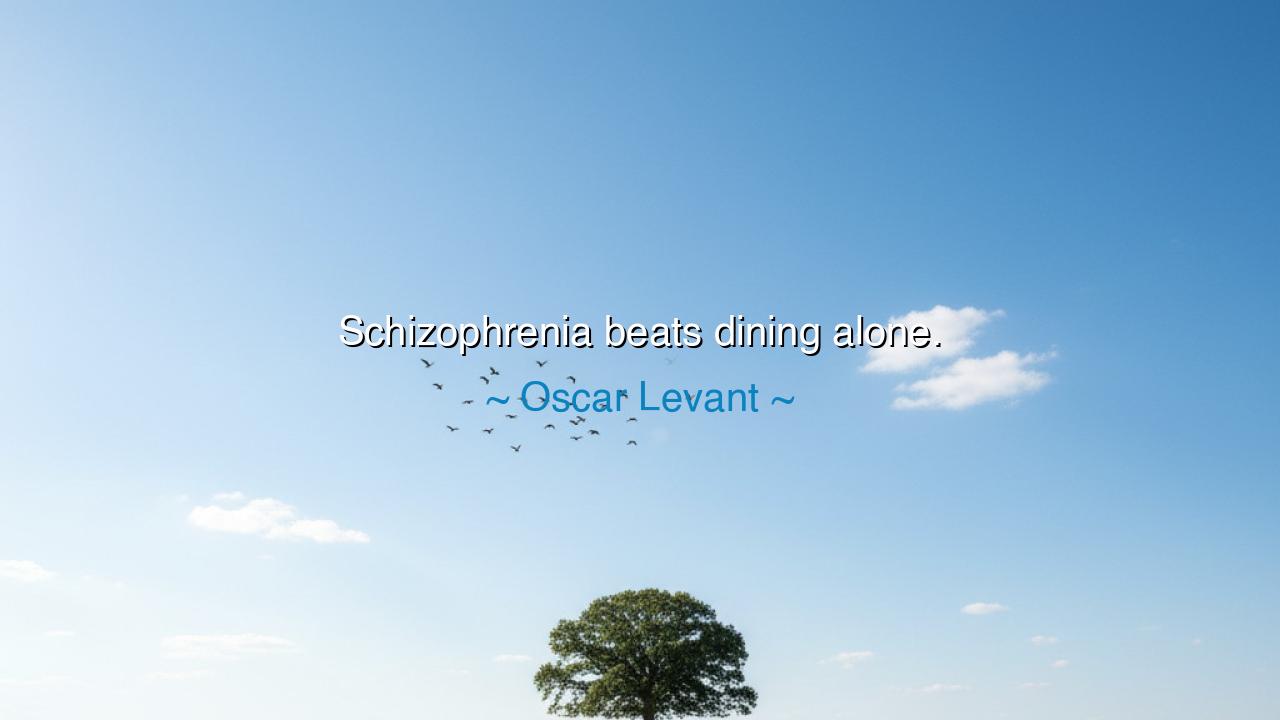
Schizophrenia beats dining alone.






In the ancient halls where philosophers once gathered to ponder the nature of the mind, there resounded a saying that would have startled them in its strange modern wit: “Schizophrenia beats dining alone.” These words, born from the restless spirit of Oscar Levant, echo with both sorrow and laughter, both madness and meaning. Levant, a man of great genius and deeper torment, spoke them not to glorify illness, but to reveal the unbearable weight of loneliness. In his humor, there trembles a cry for understanding — a cry as old as humanity itself. For to be alone, utterly unseen and unheard, can sometimes feel more dreadful than the storms of the mind.
Levant was a composer, pianist, and wit whose brilliance shone beside giants like George Gershwin. Yet within him raged a battle invisible to most — a war of the mind, the kind that isolates even in the midst of crowds. His words, “Schizophrenia beats dining alone,” were a jest forged in the furnace of despair. They unveil a paradox: that even the fragmented company of one’s own madness may seem preferable to the void of isolation. To sit alone at a table, untouched by voice or glance, can wound more deeply than the chaos within. Thus Levant’s humor, like that of many jesters before him, was his shield — a blade of irony held against the specter of emptiness.
Consider, for a moment, the tale of Friedrich Nietzsche, another soul who wrestled with his mind. He wandered the Alps, haunted by visions and divine dialogues, convinced that the gods themselves whispered in his ear. Though branded mad by the world, Nietzsche’s solitude was the forge of his genius — yet it was also his undoing. In the silence that followed his mental collapse, he no longer spoke, no longer wrote; his great mind, once aflame, fell into quiet darkness. His story, like Levant’s quip, reminds us that there is a thin and perilous thread between madness and meaning, between companionship and desolation.
In the ancient world, the Greeks saw madness not merely as disease, but as a visitation of the divine. The Delphic oracles, trembling in their trances, spoke with the tongues of gods. Plato himself said that divine madness — mania — was a gift that could inspire art, prophecy, and love. To be touched by madness, then, was to be inhabited by spirit, to be freed for a moment from the prison of solitude. Levant’s words, though born in jest, carry that same current of truth: that to feel deeply, even to the edge of breaking, may be more human than to feel nothing at all.
And yet, dear listener, we must not mistake Levant’s phrase for a celebration of suffering. It is rather a mirror held to the aching loneliness of our time. In the age of glowing screens and silent rooms, many dine alone not for lack of food, but for lack of connection. The body is fed, but the spirit starves. Levant’s lament reminds us that the human heart hungers for communion, for the warmth of another’s gaze, for the music of conversation that fills the soul. Without it, we grow strange even to ourselves.
Therefore, the lesson is this: Seek not brilliance at the cost of belonging, nor company at the cost of your mind’s peace. If you must dine alone, dine with reverence for your own spirit; if you are haunted by voices, answer them with compassion. To be human is to dwell in the tension between solitude and society, sanity and imagination. The wise learn to walk this narrow road with grace.
Let us then practice the art of listening, of reaching out, of sitting beside another in silence when words are too heavy to bear. Let us laugh, as Levant did, even through the cracks of our pain — for laughter, too, is a kind of healing. And when the darkness whispers, “You are alone,” may we remember this truth: to speak honestly, to share our suffering, to break bread together — these are the acts that keep madness from becoming despair.
So carry this teaching with you, children of tomorrow: the mind is vast, but the heart is vaster still. To walk among others with tenderness, to embrace one’s own fractures without shame — this is the path of wisdom. For even if madness comes to dine with you, it is better to greet it with laughter and compassion than to let the cold silence of loneliness swallow your soul.






AAdministratorAdministrator
Welcome, honored guests. Please leave a comment, we will respond soon